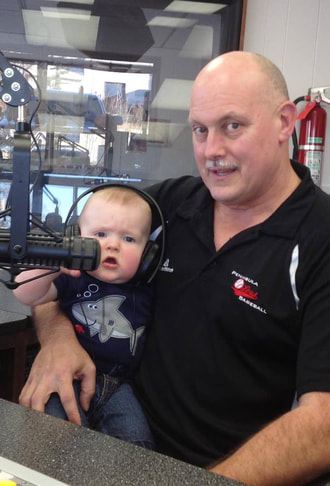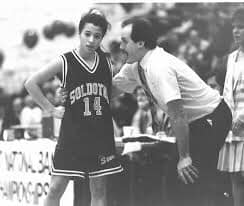|
5/15/2023 1 Comment Dan GenselFriendships are funny things. Sometimes, they exist in a fixed place and time, sturdy and strong for a particular period in our lives. A counselor of mine, Jane Estelle, once told me that human relationships are often like cab rides. They have beginnings and ends. That was wise. It's true. Sometimes, though, friendships are a ride that never ends. You don't reach a station and get out of the car. You keep going, through years and locales and jobs and other relationships and seasons of your life. And sometimes they are both. They are fixed in time and endless. Those are the best friendships. Dan Gensel was that kind of friend to me. Dan Gensel is gone. I moved to Kenai, Alaska, in November of 1991. I was 21 years old, and I didn't know anybody there. I'd come from my hometown, North Richland Hills, Texas, and had taken a job as the sports editor at the Peninsula Clarion newspaper. Why? Why not? I was 21 and unencumbered. Alaska was far away. I wanted to go and could go, and that's a combination I wasn't always going to be able to put together. Now, for example. Couldn't do it. Won't do it. Want-to isn't even a factor. Years ago, I wrote a piece for the radio program Reflections West about that time in my life and the factors compelling me to move north. You can listen to it here. My first week in Alaska, I covered a Kenai Central High School-Soldotna High School girls basketball game. It featured two of the best players in the state, two of the best players in the history of the state: Stacia Rustad of Kenai and Molly Tuter of Soldotna. On one sideline was Coach Craig Jung of Kenai, a man I'd come to greatly admire in my brief time there. On the other sideline was Coach Dan Gensel. He and Craig were great friends and ardent competitors. Stacia and Kenai were coming off a state championship; Molly and Soldotna would win one a year later. I didn't know any of that. I was just a new-in-town sportswriter, trying to figure things out. The photo above, of Dan and Melissa Smith, one of the kids I covered that season, isn't from the game in question, but it's a good approximation of the Dan Gensel of my memories. After the game, which Kenai won, he sat in the bleachers with me and just talked. Where you from? How'd you come to this job? What's your background? Getting-to-know-you stuff. I liked him, right from the start. Later, I met his wife, Kathy, and his daughter, Andrea, and liked them, too. In time, it became love. But it was like, from the get-go. Those were lonely days for me, 4,000 miles from home, alone, barely scraping by, driving an on-the-verge Ford Escort and living in a one-room apartment. Dan and Kathy took me out for my 22nd birthday, just a few months later. Dan gave me seats on school buses to far-flung tournaments and let me sleep on his hotel room floor sometimes when that was the difference between my being able to cover something and not. He also gave me a basketball education, one I tucked away, then unveiled when I wrote a short story about a wunderkind basketball player and a coach and a town that loses all sense of proportion. Here's an excerpt from Somebody Has to Lose: “Mendy, it’s like this.” He squared up to the basket, squeezing the ball between his hands and planting a pivot foot. “First option: jump shot.” Into the air he went, releasing the ball at the peak of his jump and watching it backspin softly into the net. Cash, her face red, gathered the ball and rifled it back to him. “Second option: drive.” Paul took two dribbles into the lane and then fell back to his spot on the periphery. “Third option: make the next pass.” He slung the ball to Victoria Ford, directly to his left on the wing. “You know better than to just throw the ball over without even looking.” Paul turned to the players clumped on the sideline. “Shoot, drive, pass. When you get the ball in this offense, that’s the sequence. I don’t want anybody not following it, you got that?” Yes, sir,” the girls answered glumly. "You get the ball. If the defender has collapsed into the middle, you shoot the open shot. If they’re crowding you, drive around them. If you’re covered, make the next pass. This is not difficult. Run it again.” That right there, in just a few paragraphs, is the Dan Gensel philosophy of basketball. It inverts the conventional wisdom of the time—pass first, shoot later—into a kinetic, high-scoring, fun way of playing. And, man, was he ever successful. Won a lot of games. Won a state championship. Made the hall of fame. But that's not what I remember most about him. I remember that he and Kathy and Andrea became family, particularly after I came back to Alaska in 1995 for a three-plus-year stint at the Anchorage Daily News. I remember that I was a regular guest on their downstairs couch, so much so that it developed an imprint of me. I remember that they tolerated movie nights when I'd make them watch Ed Wood and Pulp Fiction, fare that was decidedly not up their alley. I remember later visits in California and Las Vegas. I remember Andrea's wedding in the early aughts down in San Diego, when Dan asked me to give the speech before the father's speech. Predictably, I went for funny and warm, extolling my love for a family and a young woman I'd watched grow up. Dan, after me, had everybody in tears with his love for his little girl. Later, in a quiet moment between us, Dan said, "I knew you'd take them one way and I'd bring them back the other." Teamwork, baby. I remember Dan's closing out the wedding reception by climbing atop a table and lip-synching "Don't Stop Believing." I hate that song, but I love that man. I remember, a few years later, Dan's serving as the best man at my first wedding. The marriage didn't last. The friendship endured. I remember all the times we talked about getting together over the past decade or so. I remember that we didn't make it happen. That'll be the only thing I regret. It's like I said: It's a friendship fixed in time and eternal. I'll carry it now, for however long I'm around. There's been a lot of that these past few years. Too much.  It's been a long while since Dan was a basketball coach. In his final years, he was a sports radio guy--a damned good one—and a grandpa, a role he made his own in an inimitable way. He and Kathy became community stalwarts in Soldotna. Andrea and her husband, Lee, are right there. It's been a good life. It will continue to be a good life, I'm sure, but those who love Dan will have to live with a big hole in it. It's a testament to the community Dan helped me build thirty-odd years ago that one of his former players, someone with whom I've been close since I was a 21-year-old green sportswriter riding a school bus, contacted me with the news. I spent just six months in that job at the Peninsula Clarion. My Facebook page is full of people I knew then and still know now, and I'm a lucky boy, indeed. Dan was 34 when I met him and 66 when he died, and that's both a long time and not nearly enough of it. I'll miss him.
1 Comment
court
5/17/2023 04:19:33 am
just beautiful. stunned to hear how young he was. what a richly told tale of friendship.
Reply
Your comment will be posted after it is approved.
Leave a Reply. |
About CraigCraig Lancaster is an author, an editor, a publication designer, a layabout, a largely frustrated Dallas Mavericks fan, an eater of breakfast, a dreamer of dreams, a husband, a brother, a son, an uncle. And most of all, a man who values a T-shirt. Archives
July 2024
By categoryAll 600 Hours Of Edward And It Will Be A Beautiful Life Awards Books Bookstores Community Connection Craft Craig Reads The Classics Dreaming Northward Education Edward Adrift Family Geography History Libraries Memory Montana NaNoWriMo Northward Dreams People Plays Poetry Public Policy Q&A Social Media Sports Stage Texas The Fallow Season Of Hugo Hunter The Summer Son This Is What I Want Time Travel Work Writers Writing Archives
July 2024
|

 RSS Feed
RSS Feed